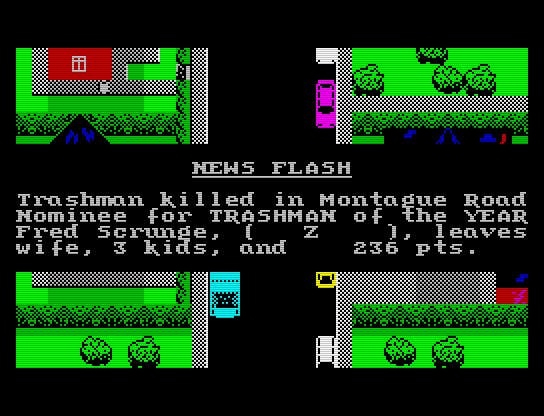Trashman
Rubbish!
Some would argue that those involved in developing games on the 8-bit computers had a much easier time of it than their equivalents today. With a clean inspirational slate, the creative juices of the game designers could really let rip and turn pretty much any concept, idea or situation into a title the public would lap up.
Inspiration, however, routinely slapped game designers in the face. You can just imagine the New Generation Team at the local café discussing ideas for their next monster hit on the Spectrum: As the waitress arrives to clear away the remains of the Chelsea buns, dregs of tea and soiled napkins one of the party shouts, "That's it! We shall make a game about rubbish collection and call it Trashman". It seems so obvious.
The bin man comes around every Monday morning at my place - a chirpy chap, always wearing a smile and sporting a spring in his step. In Trashman (a less conventional ‘British' job-name chosen to maximise sales abroad), you become the bin collector, emptying the trash cans left out by suburban folk into your waiting dust lorry. No "green bins for this" and "blue bins for that" in this game. Trashman was released at a time when rubbish was unambiguous and uncomplicated.

With boy racers screaming by intent on putting you in casualty, intruder hating dogs (who obviously over slept that morning and missed the postman) biting at your ankles and a bin wagon driver who just wants to finish off the street and go home, the task of rubbish collection becomes somewhat challenging.
The game cleverly hides what is in fact a very dull, mundane task. Credit therefore has to be given to Malcolm Evans, the game's author, for recognising the potential playability in such a title and implementing it in such a ‘rubbish', I mean fantastic, way.
